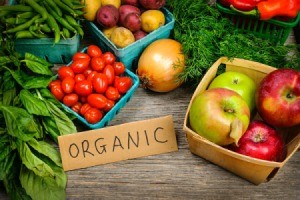
Thanks
Janine from CO
It is much more than packaging. This was USDA's definition of "Organic" effective since October 21, 2002. All farms and products claiming to be organic needed to be guaranteed by a USDA-approved independent agency to meet the following guidelines:
There are variations in labeling claims including "100% organic" (all organic ingredients), "organic" (at least 95% organic ingredients), and "made with organic ingredients" (70% organic ingredients).
Unfortunately, as I write this, congress passed a congressional rider that weakens these standards by allowing certain synthetic food additives to be added to organic products without notifying the consumer.
Organic food costs more for several reasons:
Since your friend already buys organic, consider pitching in to buy a share in a community-supported agriculture (CSA) program. You pay a fee at the beginning of the season and in return, you receive weekly boxes of fresh fruits, vegetables and flowers (whatever is in season). Another option is to join a local food co-op, where members get a discount on purchases (volunteer and get more). Also try buying from farmer's markets, buying in bulk, stocking up on whatever is in season and then canning or freezing it, or try growing your own. In the off-season, when produce is more expensive, buy frozen or canned.
Well in answer to the 2nd post 1st, organically grown foods have been found to contain pesticides - but far less than 'conventionally' grown .
The sad fact is our environment has been poisoned - there's no escape from it, but buying & consuming organic products does help reduce your own personal exposure & also supports agricultural practices that are less harmful to our environment/ecology.
As for the 1st question, most organic costs approx. the same as 'conventional' here where I live.But there are more than a few co.s that charge 'what the market will bear' - that is, many people don't question higher $$ for organics coz they perceive it as higher quality (which it usually is).
& what many do not realise is that the super cheap prices for 'conventional' foods are the result of subsidies - so tax $$ pays the costs - a.k.a. 'hidden' costs.Environmental damage, loss of habitat/ecosystems, farmworker healthcare - not to mention cheap imports which put US producers @ a disadvantage - all get paid for out of taxpayer pockets - sooner or later.So you either pay a bit more up front or subsidise (for a lot more) the 'hidden' costs of 'cheap' food .
FWIW, I belong to a small co-op - about a dozen members buy from a local organic distributor & have membership w/ a local CSA(community supported agriculture) organic farm.(You might check to see if there is a CSA in your area - they're almost everywhere.)We order every other week & split the costs - 2 weeks worth of organic produce & organic eggs costs me less than $30 & feeds my household of 3 adults.
I have a garden too & fruit trees - all organic.
This page contains the following solutions.
I've been wanting to feed my family more organic fruits and vegetables but I always get sticker shock when I am in the supermarket. I decided to sign up for organic delivery with a local company.
Organic foods are often the better choice when purchasing food, especially produce. Here are some helpful FAQ's about organic food.
Some produce has more pesticides than others. Where organic isn't always available, it is good to know which produce is safest. This is a page about how to prioritize organic produce purchases.